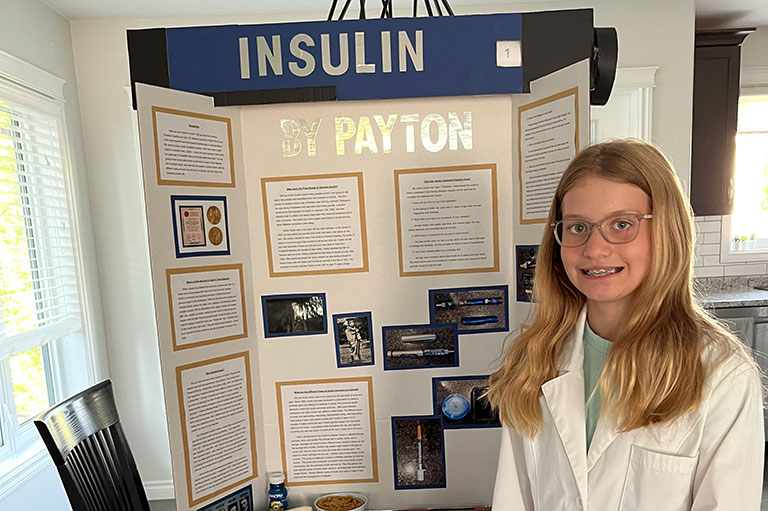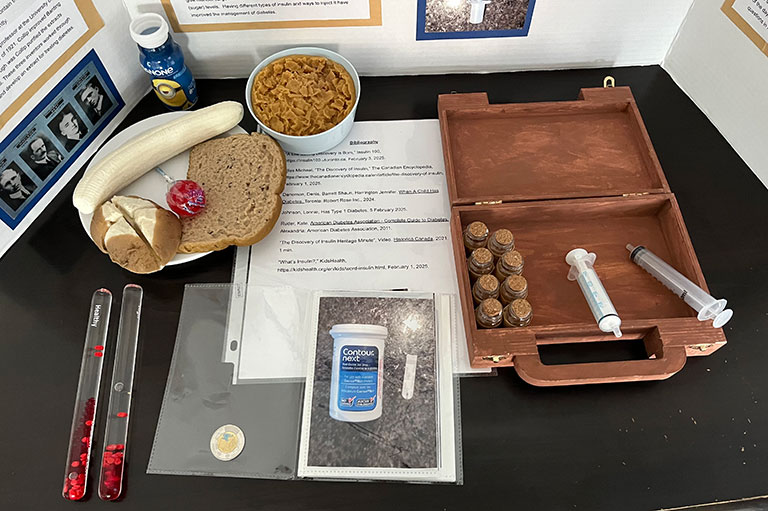Payton J.

Insulin
Payton J.
Saskatchewan Virtual Heritage Fair
SK
Did you know Frederick Banting and John J.R. Macleod won a Noble Prize for one of the most important break throughs in medical history. When a person has diabetes, their pancreas produces little or no insulin. Insulin is a hormone your pancreas produces to control the level of glucose in our blood. When we eat foods such as bread, rice, cereal, pasta, potatoes, fruits, milk, yogurt, and sweets are pancreas releases insulin to help the glucose enter the cells. Our body uses glucose for energy now or stores for later.
Frederick Banting, Charles Best and James Collip invented insulin. John J.R. Macleod was their supervisor. Did you know Frederick Banting developed his idea of insulin when preparing a talk for medical students? Banting thought if he could stop the flow of digestive juices out of the pancreas by blocking the juices, then a different cell could release the insulin. He could isolate insulin to treat diabetes.
The first two people to receive insulin were Leanord Thompson and Teddy Rider. The first dose was on January 11th, 1922, and was not effective. After 12 days of purifying the insulin, it was successful. Teddy received his dose on July 10th, 1922. Teddy was able to live to 71 years of age due to insulin.
The different types of insulin are rapid, fast, intermediate, and long acting. Fast acting is taken before a meal and works in 15 minutes. It helps control the rise in blood glucose for 3-4 hours. Long-acting works during the day and night by giving you low levels of insulin all the time. There are three ways to inject insulin. The three ways are syringe, pump, or pen.
I interviewed my uncle Lonnie to better understand how having diabetes impacts his life and how he manages his diabetes with insulin. Lonnie was diagnosed with Type 1 Diabetes at the age of 27. Some symptoms he experienced were increased thirst, tiredness, weight loss and craving sweet foods. My uncle uses fast and long-acting insulin. He injects his insulin using an insulin pen. He monitors his blood glucose by using a continuous blood sugar monitor.
Insulin is important to Canadian History because it has made a great impact on people’s lives all around the world. Insulin has helped people with diabetes to live long and healthy lives.
What sources and evidence did you consult for your project? What different perspectives did they provide on your topic?
The online websites provided me with the heritage of who discovered insulin and how they overcame their challenges. My book resources provided me with further understanding of how the body uses insulin, the different types of insulin and how insulin is injected to manage diabetes. Finally, my interview with my uncle who has Type 1 Diabetes gave me a better perspective on what it is like to live with diabetes and the importance of insulin in his daily life.
Bibliography
“A Life Saving Discovery is Born,” Insulin 100, https://insulin100.utoronto.ca, February 3, 2025.
Bliss Micheal, “The Discovery of Insulin,” The Canadian Encyclopedia, https://www.thecanadianencyclopedia.ca/en/article/the-discovery-of-insulin, February 1, 2025.
Daneman, Denis, Barrett Shaun, Harrington Jennifer. When A Child Has Diabetes. Toronto: Robert Rose Inc., 2024.
Johnson, Lonnie, Has Type 1 Diabetes, 5 February 2025.
Ruder, Kate. American Diabetes Association - Complete Guide to Diabetes. Alexandria: American Diabetes Association, 2011.
“The Discovery of Insulin Heritage Minute”, Video. Historica Canada, 2021. 1 min.
“What’s Insulin?” KidsHealth, https://kidshealth.org/en/kids/word-insulin.html, February 1, 2025.

What is the historical significance of your topic?
Frederick Banting, Charles Best and James Collip were successful in developing a purified insulin, which they were able to treat children with Type 1 Diabetes. With this discovery, children around the world were able to use the insulin to treat their Type 1 diabetes. The short-term impact was the children were able to gain weight, return to their daily activities and regain their strength. The long-term impact was now people with diabetes could live long and healthy lives.
Why did you choose this topic?
I chose this topic because I think insulin is a great part of Canadian history as it has saved many lives. I also wanted to have a better understanding of how having diabetes impacts a person’s life. I was interested in learning about how people manage their diabetes with insulin.

